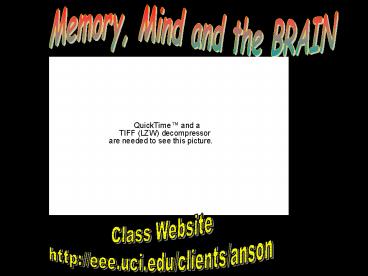Memory, Mind and the BRAIN - PowerPoint PPT Presentation
1 / 30
Title:
Memory, Mind and the BRAIN
Description:
Memory, Mind and the BRAIN – PowerPoint PPT presentation
Number of Views:77
Avg rating:3.0/5.0
Title: Memory, Mind and the BRAIN
1
Memory, Mind and the BRAIN
Class Website http//eee.uci.edu/clients/anson
2
Instructor Dr. Dickinson-Anson (anson_at_uci.edu)
TA Dorna Jafari (jafarim_at_uci.edu)
- TEXT L.R. Squire E.R Kandel (2001)
- Memory From Mind to Molecules
- Course Goals
- Brain function
- Brain processes involved in learning memory
- Memory anomalies
- Experimental technique assessment procedures
used in memory research
3
- Office Hours email M, W 1200-100 McGaugh
Hall (1205) X8949 anson_at_uci.edu - ADD/DROP POLICY Handled through TELE . No
add/drops after the first 2 weeks. - EXAM SCHEDULE WEIGHTING 3 exams (34 points),
will cover the 9 preceding lectures and readings.
Total of points for the 3 exams will determine
course grade. - GRADING Grading will be on the curve. The
breakdown of grades will be approximately 20 A,
35B, 35C and 10 D/F.
4
What is it that makes you, you?
5
fright
Memory!
joy
loved ones
friends, enemies
6
No Memory loss of self, personal history
loss of interactions w/ others
7
YET....
You take it for granted!!!!!
8
824-8949
9
Memory
- What is it?
- Why is it it that trying to recall something is
like trying to catch a darting phantom? - Why are there reports of false memory?
- Why do people vividly remember alien abductions?
- Scientists can easily get some people to remember
events THAT NEVER HAPPENED!
10
Does this suggest?
- Memory is reliable in allowing recall of general
sketches of past momentsbut LESS reliable in its
recall of specific detail? - Our memory system protects us from the chaos that
would occur if we had immediate access to
everything ever experienced.
11
To Answer these questions, we MUST figure out
what memory is....
12
What we Know
- Memory composed of a of distinct processes
systems - are not passive, judgment-free recordings of
experiences but, contain meaning, sense
emotions. - Encoded by networks whose connections have
already been shaped by previous experiences,
soprior experiences powerfully influence how
we encode store new memories.
13
The Nature of Memory
- Biological structures
- Psychological character organization
- Longevity
Subject of investigations for centuries
14
3 revolutions have led to current thought
behaviorist
cognitive
biological
15
Before Golden Era of 19th Century
introspection
Logical analysis
arguement
16
Hermann Ebbinghause (1880s)
- Quantitative methods
- BIK, REN, VEG
- Differed repetitions various time intervals for
recall - Main Contributions
- Memories different life spans
- Short lived (minutes)
- Long lived (days, months)
- Repetition makes memories last longer
17
Georg Muller Alfons Pizecker
- Memory becomes consolidated w/ time
- Resistant to interference
- Early on memory vulnerable
18
William James
- Distinction between STM LTM
- STM sec-min, extension of present moment
- LTM weeks, month, life, consulted by reaching
back into past
19
Insights into structure/organization of normal
memory
Serge Korsakoff (1887)
Alois Alzheimer (1906)
20
Behaviorist Revolution (mid 1800-early 1900)
- Ebbinghaus studies of human memory Darwin
belief that human evolved from simpler animals
led Pavlov Thorndike to systematic studies of
animal L M
21
John Watson Behaviorist Manifesto
- Learning could be understood in terms of simple
stimulus -response associations w/o consideration
of VAGUE concepts of consciousness
22
Behaviorism
- Positives
- Lawful principles of associations betwn stimuli
- Reinforcement key to understanding of learning
- Negatives
- Can study only observable phenomena
- No examination of cognitive processes
23
Cognitive Revolution (mid 1900)
- Frederic C. Bartlett
- Naturalistic studies
- Memory fragile susceptible to distortion
- Retrieval not a replay of stored info but
creative reconstructive process
24
1960s Focus
- Flow of info from sense organs to internal rep in
brain for eventual use in memory action
inter connectivity of cells
25
How do you study these internal
representations scientifically?!!!
26
Join Forces w/ BIOLOGY!!!!!!!!
27
Biological revolution (2 components)
- Molecular -examine how cells talk to each other
change each other. How are memories stored? - Systems (where) - observe multiple brain areas in
behaving animals. Where are memories stored?
28
Donald Hebb
- Assemblies of cells work together to represent
info - No single memory region exists, many parts
participate in rep of single event.
29
CURRENT VIEW
- MEMORY IS WIDELY DISTRIBUTED, BUT DIFFERENT
AREAS STORE DIFFERENT ASPECTS OF THE WHOLE.
30
HOW ARE MEMORIES STORED?
- Change in signaling between nerve cells which
depends on changes w/i neuron. - Study by looking at simple nervous sys to id
molecular changes w/i nerve cells responsible for
l m - Also, look at more complex systems for more
complex memory































